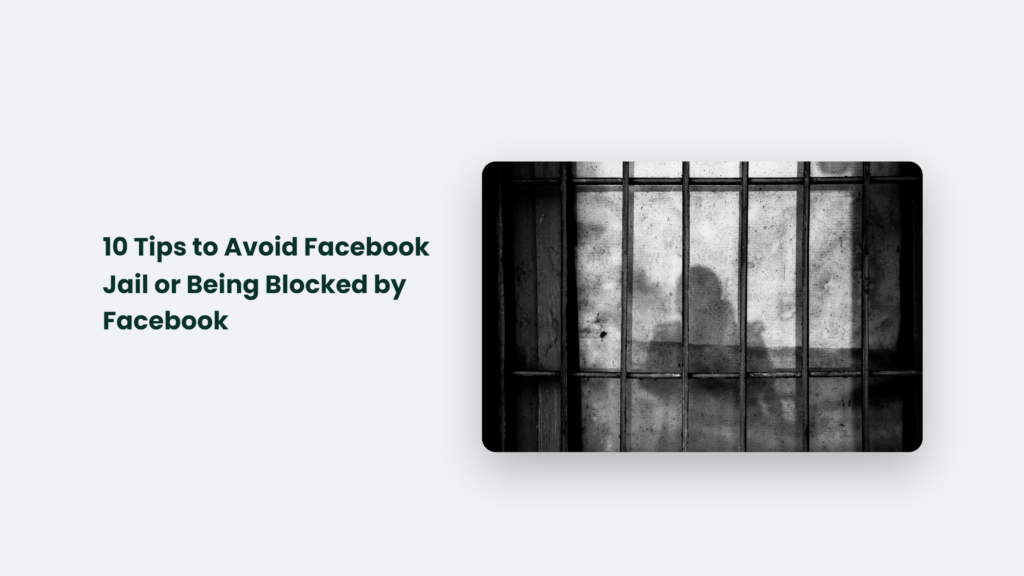

10 Tips to Avoid Facebook Jail or Being Blocked by Facebook

As Seen On
Are you tired of being subject to Facebook‘s restrictive policies? Are you wondering why some posts get blocked while others seem to fly under the radar? If you’ve ever felt like a criminal in a digital prison, it’s time to set yourself free.
From creating smart captions that play by Facebook’s rules to understanding exactly which kinds of content can lead you right into “Facebook Jail,” these 10 essential tips will help ensure your online safety and success without compromising your creative content ideas.
Discover how to avoid pesky bans, blocks, and suspensions from each post so that all your hard work doesn’t go down the drain!

What is Facebook Jail: The Arrest – An Innocent Social Media User’s Plight
Facebook Jail is a euphemism for when Facebook temporarily suspends users from their accounts. Its punishing nature has caused a stir among social media enthusiasts, and along with the proliferation of fake news, the spectre of Facebook Jail has come to reflect what many believe is wrong about living and communicating in an emotionally mediated digital world.
For most people, the risk of going to ‘jail’ is relatively low, and it’s typically resolved within 24 hours; however, some users have had their privileges revoked for weeks or months at a time.
Still, regardless of how long it lasts or when you get sent there, the feeling that someone is deciding what you can or cannot say or do on social media—often without justification—is undoubtedly disorienting.
Consequently, we should appreciate how our communication tools go beyond sheer convenience into contexts that influence how we think, act and even feel.
Let me regale you with the story of Billy, a hapless young lad who found himself on the wrong side of the Facebook law.
Billy was a simple guy who enjoyed sharing cat memes and posting pictures of his meals.
One day, he made the fatal mistake of posting a joke that ruffled a few feathers. Within minutes, he was shackled and hauled away to Facebook Jail. Billy’s friends and family were left in the dark, wondering where he’d gone.
So, how did Billy end up in this pickle? There are a few possible reasons:
- He might have posted something that violated Facebook’s ever-changing and often vague Community Standards.
- He could have been targeted by a mob of angry internet users who reported him en masse.
- He may have tripped some mysterious algorithm that decided his fate.
In any case, Billy was caught in the crossfire of Facebook’s war on misinformation, hate speech, and general tomfoolery.
What will put you in Facebook jail: Top Reasons for being put in Facebook jail

Spamming
Spamming is among the most common reasons for being put in Facebook jail. Spamming refers to the act of posting the same message over and over again or posting irrelevant or unwanted messages in a thread. This can be extremely annoying for other users, and Facebook will often take action to protect its users from spam.
Posting Inappropriate Content
Another reason for being put in Facebook jail is posting inappropriate content. This includes anything that is sexually explicit, violent, or otherwise offensive. It is important to remember that Facebook is a public platform, and many people of different ages and backgrounds use the site. As such, it is important to be respectful of others when posting content.
Posting False Information
Posting false information is also grounds for being put in Facebook jail. This includes anything from making up fake news stories to spreading misinformation about products or services. Facebook takes its role as a source of information seriously and will not tolerate users who post false information on the site.
Engaging in Hate Speech
Hate speech attacks or demeans a group of people based on race, religion, gender, or sexual orientation. This type of speech is not tolerated on Facebook, and users who engage in it will be put in Facebook jail.
Bullying
Bullying is another form of harassment that is not tolerated on Facebook. Bullying refers to the act of repeatedly sending abusive or threatening messages to another user to cause them distress. This type of behaviour can be extremely harmful, and Facebook will take action to protect users who are being bullied.
Impersonating Another User
Impersonating another user is also grounds for being put in Facebook jail. This includes creating a fake profile that uses someone else’s name and information or pretending to be someone else in order to send messages or comments on their behalf. This type of behaviour can be confusing and misleading for other users, so Facebook does not tolerate it.
Creating Multiple Accounts
Creating multiple accounts is also against Facebook’s terms of service. This includes creating more than one personal account or creating multiple accounts for business purposes. Creating multiple accounts can be used to spam other users or engage in other prohibited activities, so Facebook does not allow it.
Liking or commenting on too many posts.
Facebook may put users in jail if they like or comment on too many posts in a short period. This is because Facebook considers this behaviour spammy and can clutter up people’s News Feeds.
Sending too many friend requests
Sending too many friend requests in a short period is also considered to be spammy behaviour by Facebook. If you do this, you may be put in Facebook jail.
How to Avoid Being in Facebook Jail:
Nobody wants to end up in Facebook Jail, but with the platform’s ever-changing rules and algorithms, it can feel like navigating a minefield. Fear not, fellow social media users, for I have compiled a list of tips to help you stay on the right side of the law:
Familiarize Yourself with Facebook’s Community Standards
The first step to avoiding Facebook Jail is understanding the game’s rules. Take the time to read and understand Facebook’s Community Standards, which outline the types of content and behaviour that are not allowed on the platform. These include:
- Violence and criminal behaviour
- Safety threats
- Objectionable content (such as hate speech, graphic violence, and nudity)
- Integrity and authenticity (including spam, misinformation, and fake accounts)
- Intellectual property violations
Don’t send too many friend requests in a short amount of time:
Avoiding Facebook jail isn’t rocket science but requires some finesse. The biggest mistake many people make is sending too many friend requests in a short time, which is a surefire way to attract the attention of the Facebook powers-that-be.
If you’re serious about your social media game and don’t want to be locked out of your account, then do the responsible thing and limit yourself to just a handful of new friends each day.
That’ll minimize any chance of running afoul of Facebook’s strict policies on over-friending. On top of this, refraining from posting incendiary comments or responding negatively to random posts will keep you out of trouble and off their radar entirely.
Don’t act like a spammer:
One of the key pieces of advice I have for anyone who wants to avoid getting thrown in Facebook jail is not to act like a spammer. You can ensure this by thinking carefully before doing anything on the platform – think twice and press post once.
Ask yourself if what you’re doing might be considered inappropriate or could be labelled as too repetitive, such as posting the same message multiple times or unnaturally tagging people in posts.
It’s also important to ensure that other users haven’t reported any links, videos, GIFs, or photos you’ve posted before either – if they have been reported, your post will likely get flagged by Facebook. If you follow these simple guidelines, you should have no difficulty avoiding a dreaded stint in Facebook jail.
Don’t use abusive or hate speech:
Social media platforms like Facebook have struggled to protect users from vitriolic speech and hurtful language. One way to ensure you don’t get suspended or booted off the site altogether (AKA ‘Facebook Jail’) is to avoid engaging in hate speech or abusive language. It can be hard to remember sometimes that we’re all here just trying to connect with friends and family and aren’t necessarily trained in diplomacy like politicians.
So, take a step back before you fire off an offensive response or comment – even if you think it’s a joke – as one mistake could mean your page receiving a suspension. The best route forward is to keep the conversation civil, avoid profanity, and not attack individuals on their beliefs. That is the surest way to stay out of Facebook jail!
Set a frequency of sharing posts on Facebook:
To avoid the dreaded Facebook Jail, it’s important to set a frequency of when and how you post. If you overload the platform with too many posts in a short period of time—regardless of what they are—Facebook will no longer be your friend and may think you’re a bot or simply trying to game their system.
The best way to stay out of Facebook jail is to make sure that you spread out your posts throughout the day and week. This can be as easy as using an app like Buffer or Hootsuite to allow you to schedule your updates so that everything will be spread out nicely for maximum engagement, but won’t get alarmed by your frenetic activity!
Logging into Multiple Accounts at the Same Time:
It might seem like an easy solution to turn to multiple Facebook accounts if you feel yourself approaching social media jail, but accessing more than one account simultaneously will only worsen your situation in the long run.
Facebook has zero tolerance for this behaviour and actively monitors user activity for suspicious logins and inter-account connections. Instead of resorting to multiple profiles that are more likely to earn you a permanent ban from social networking, try changing up your content routine instead.
Post fewer memes and more thoughtfully written pieces so your audience can better connect with whatever message you’re trying to spread.

Don’t use automated software or scripts to post content:
If you’re an active Facebook user who wants to avoid getting locked out of your account, it’s important to be wary of automatic software and scripts. While some people might think that scripting can help them gain more traction on the platform, it can cause Facebook to flag your content for violations and even put you on what’s called “Facebook jail.”
Don’t post explicit content:
It goes without saying that one of the surest ways to avoid Facebook jail is not to post explicit content. We all know what gets us into trouble, so it pays to keep it PG-13 at all times. That being said, if you’re sharing anything controversial, exercise caution and think before you post.
If you take the time to be mindful of your words and think things through instead of responding impulsively, you can avoid a lot of trouble on this expansive social network.
Moderation is key; don’t overdo it by trying to create viral “shock posts” – stick with content that fits within the confines of Facebook decency and etiquette policies, and everyone will be much better off.
Create original content:
If you want to ensure you don’t end up in Facebook jail, one of the best courses of action is to focus on creating content that is uniquely original. This means taking the time to craft something worthwhile and not relying too heavily on reposting or sharing the same material as everyone else.
It’s all too easy to get trapped in a loop of simply consuming and redistributing information without ever pausing to come up with something creative and new.
Take advantage of this unprecedented access to an expansive global audience, use your voice and make something meaningful from it. No algorithm can regulate real human creativity!
Do not like or comment too much:
If you want to avoid the clutches of Facebook Jail, one of the key things to do is watch the amount of liking and commenting that you do. Oversaturation of this kind can easily trigger the algorithm to put you in time-out if it thinks you are behaving too much like a robot.
So make sure you’re spreading your activity across multiple sites and paying attention to how often you’re liking and commenting on posts, as it’s all too easy to overdo it. Remember that content matters, too.
Whenever possible, post engaging comments or start a relevant conversation — this will show Facebook’s algorithm that your behaviour is genuine, so you’ll be less likely to run into any bad trouble.
What happens when you get banned from Facebook?
When you get banned from Facebook, it can be a frustrating and disappointing experience. This is especially true for those who heavily rely on the site to stay connected with family and friends or promote their businesses or organizations. Depending on the circumstances of the ban, it can be permanent or temporary; in both cases, the user will lose access to their account and all the content it contains.
Suppose you decide to challenge Facebook’s decision. In that case, it is important to thoroughly read through their terms and conditions so that you understand exactly why your account was banned in order to increase your chances of success.
Frequently Asked Questions:
What is Facebook Jail?
Facebook Jail is a term used to describe a temporary or permanent ban from the site due to violations of its terms and conditions. This could be anything from posting explicit content, spamming, or otherwise behaving inappropriately on the platform.
The Bottom Line:
Facebook Jail is real, and it can happen to anyone. Reading through their terms and conditions and establishing a presence that follows them will help you stay off its radar. Above all else, be mindful of what you post — stay away from explicit content, create original ideas, and don’t overdo it with likes and comments.
By following these simple steps, you’ll be able to maximize your chances of staying on Facebook’s good side and avoiding any potential consequences. Good luck!
Konger
Up until working with Casey, we had only had poor to mediocre experiences outsourcing work to agencies. Casey & the team at CJ&CO are the exception to the rule.
Communication was beyond great, his understanding of our vision was phenomenal, and instead of needing babysitting like the other agencies we worked with, he was not only completely dependable but also gave us sound suggestions on how to get better results, at the risk of us not needing him for the initial job we requested (absolute gem).
This has truly been the first time we worked with someone outside of our business that quickly grasped our vision, and that I could completely forget about and would still deliver above expectations.
I honestly can't wait to work in many more projects together!
Disclaimer
*The information this blog provides is for general informational purposes only and is not intended as financial or professional advice. The information may not reflect current developments and may be changed or updated without notice. Any opinions expressed on this blog are the author’s own and do not necessarily reflect the views of the author’s employer or any other organization. You should not act or rely on any information contained in this blog without first seeking the advice of a professional. No representation or warranty, express or implied, is made as to the accuracy or completeness of the information contained in this blog. The author and affiliated parties assume no liability for any errors or omissions.

